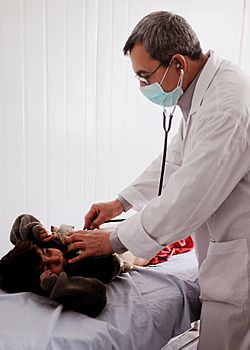Respiratory therapist facts for kids

A clinician auscultating the chest of a pediatric patient.
|
|
| Occupation | |
|---|---|
| Names |
|
|
Occupation type
|
Specialty |
|
Activity sectors
|
Nursing, Medicine, Allied Health |
| Description | |
|
Education required
|
|
|
Fields of
employment |
Flight Transport, Air Ambulance Teaching or nursing home |
|
Related jobs
|
|
A respiratory therapist is a special healthcare helper. They are trained to work with people who have problems with their lungs or breathing. These therapists go to college and pass a national test. This test makes sure they are ready to help patients.
The NBRC (National Board for Respiratory Care) is an organization that gives certifications. These certifications show that a therapist has special skills. As of 2017, there were seven main areas of respiratory therapy. These include:
- CRT (Certified Respiratory Therapist)
- RRT (Registered Respiratory Therapist)
- CPFT and RPFT (Certified or Registered Pulmonary Function Technologist)
- ACCS (Adult Critical Care Specialist)
- NPS (Neonatal/Pediatric Specialist)
- SDS (Sleep Disorder Specialist)
Contents
Where Respiratory Therapists Work
Respiratory therapists work in many different places. Most often, you will find them in hospitals. They work in intensive care units for adults, kids, and even newborn babies. They also work on regular hospital floors and in emergency rooms.
Helping with Breathing Tests
Some therapists work in labs where they do special lung tests. These are called Pulmonary Functioning Labs (PFTs). They help doctors understand how well a person's lungs are working.
Helping People Sleep Better
Respiratory therapists also work in sleep labs. Here, they help diagnose and treat sleep problems. They might help people who stop breathing while they sleep.
Care at Home
Sometimes, therapists help patients at home. They might set up special equipment. This equipment can include oxygen tanks or machines that help with breathing.
What Respiratory Therapists Do
Respiratory therapists are experts in many areas. They know a lot about the heart, lungs, and sleep. They are skilled in managing a person's airway. This means they can help keep a person's breathing tube open. This is very important during emergencies or serious illnesses.
Life Support and Transport
These therapists help people who need life support. This means they help machines breathe for patients. They work in intensive care units and emergency departments. They also help move very sick patients safely. This can be by air ambulance or ground ambulance.
Teaching and Helping in Clinics
Respiratory therapists also teach people. They might work in asthma clinics. Here, they teach kids and adults how to manage their asthma. They also work in clinics for kids and in sleep clinics. They help find out if someone has a sleep disorder. Some therapists work in heart clinics too. They also help people in pulmonary rehabilitation programs. These programs help people with lung problems get stronger.
Images for kids
 | George Robert Carruthers |
 | Patricia Bath |
 | Jan Ernst Matzeliger |
 | Alexander Miles |





